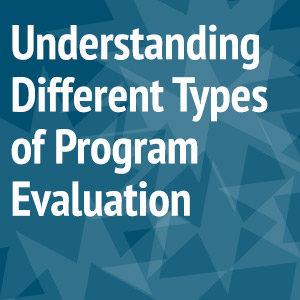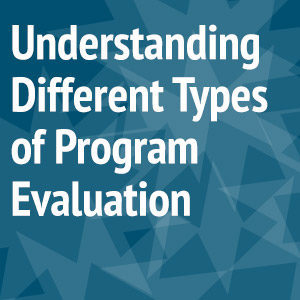A Brief Guide to Evaluation (Part 3): The Uses of Evaluation Findings
One of the most important questions to consider before starting an evaluation is, “How will evaluation findings be used?” There are a number of ways
One of the most important questions to consider before starting an evaluation is, “How will evaluation findings be used?” There are a number of ways
When you and your colleagues consider conducting an evaluation, it is critical that you be clear about who the evaluation is for. Your organization is
This is the first in a series of blog posts, that outlines the key elements of an evaluation. There are many things in the world
Group facilitation is a critical element in many evaluations. Although the definition of “facilitation” varies, one view of it is, “A process in which a
Nonprofit organizations and program evaluators are increasingly being called upon to evaluate multi-stakeholder initiatives. These initiatives often depend upon collaboration among various organizations and agencies.
Dawn Bentley of the Michigan Association of Special Educators recently drew my attention to an important article appearing in the Huffington Post, “Proven Programs vs. Local Evidence,”
Qualitative interviews can be an important source of program evaluation data. Both in-depth individual interviews and focus group interviews are important methods that provide insights
Before beginning an evaluation, it may be helpful to consider the following questions: 1. Why is the evaluation being conducted? What is/are the purpose(s) of the evaluation?
How do programs know what they should be doing— which target populations require services, the types of services programs should provide, the amounts of services,

Program evaluations are conducted for a variety of reasons. Purposes can range from a mechanical compliance with a funder’s reporting requirements, to the genuine desire
One of the most important questions to consider before starting an evaluation is, “How will evaluation findings be used?” There are a number of ways
When you and your colleagues consider conducting an evaluation, it is critical that you be clear about who the evaluation is for. Your organization is
This is the first in a series of blog posts, that outlines the key elements of an evaluation. There are many things in the world
Group facilitation is a critical element in many evaluations. Although the definition of “facilitation” varies, one view of it is, “A process in which a
Nonprofit organizations and program evaluators are increasingly being called upon to evaluate multi-stakeholder initiatives. These initiatives often depend upon collaboration among various organizations and agencies.
Dawn Bentley of the Michigan Association of Special Educators recently drew my attention to an important article appearing in the Huffington Post, “Proven Programs vs. Local Evidence,”
Qualitative interviews can be an important source of program evaluation data. Both in-depth individual interviews and focus group interviews are important methods that provide insights
Before beginning an evaluation, it may be helpful to consider the following questions: 1. Why is the evaluation being conducted? What is/are the purpose(s) of the evaluation?
How do programs know what they should be doing— which target populations require services, the types of services programs should provide, the amounts of services,

Program evaluations are conducted for a variety of reasons. Purposes can range from a mechanical compliance with a funder’s reporting requirements, to the genuine desire
One of the most important questions to consider before starting an evaluation is, “How will evaluation findings be used?” There are a number of ways
When you and your colleagues consider conducting an evaluation, it is critical that you be clear about who the evaluation is for. Your organization is
This is the first in a series of blog posts, that outlines the key elements of an evaluation. There are many things in the world
Group facilitation is a critical element in many evaluations. Although the definition of “facilitation” varies, one view of it is, “A process in which a
Nonprofit organizations and program evaluators are increasingly being called upon to evaluate multi-stakeholder initiatives. These initiatives often depend upon collaboration among various organizations and agencies.
Dawn Bentley of the Michigan Association of Special Educators recently drew my attention to an important article appearing in the Huffington Post, “Proven Programs vs. Local Evidence,”
Qualitative interviews can be an important source of program evaluation data. Both in-depth individual interviews and focus group interviews are important methods that provide insights
Before beginning an evaluation, it may be helpful to consider the following questions: 1. Why is the evaluation being conducted? What is/are the purpose(s) of the evaluation?
How do programs know what they should be doing— which target populations require services, the types of services programs should provide, the amounts of services,

Program evaluations are conducted for a variety of reasons. Purposes can range from a mechanical compliance with a funder’s reporting requirements, to the genuine desire
Please enter your information below to receive a copy of this whitepaper.
Please enter your information below to receive a copy of this whitepaper.
Please enter your information below to receive a copy of this whitepaper.
Please enter your information below to receive a copy of this whitepaper.